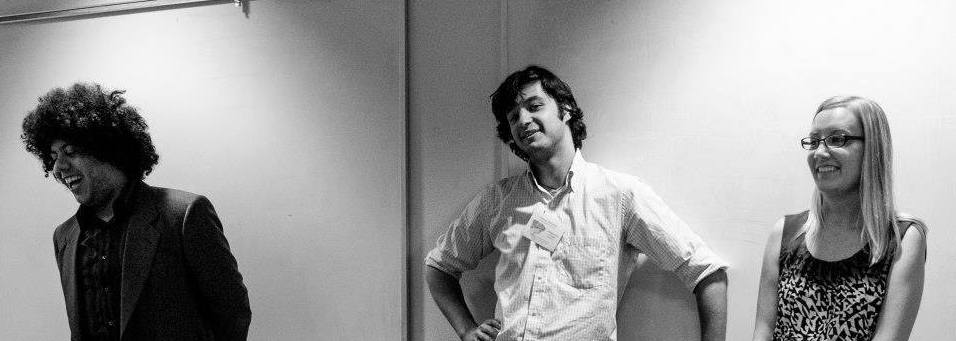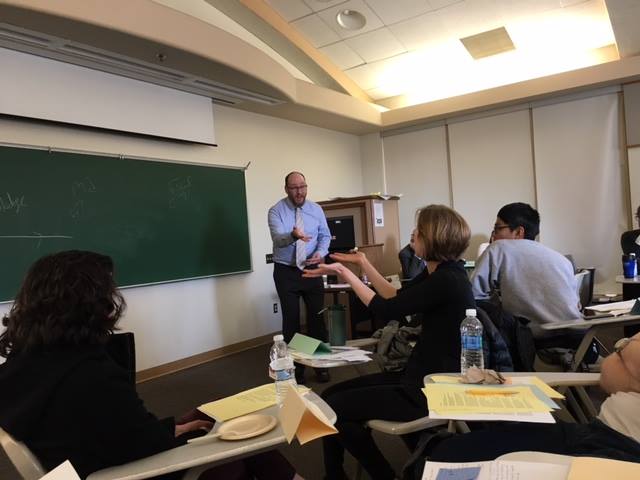Inclusive Pedagogy Instruction and Resources
I also help my peers in Pittsburgh reflect upon their own teaching strategies and how to incorporate inclusive practices in future courses. I have also been invited to co-lead (with Liam Kofi Bright) the inclusive pedagogy session of the graduate student instructor training courses for both the University of Pittsburgh Department of Philosophy (Fall 2014, 2015, 2016, 2017, 2018) and the University of Pittsburgh Department of History and Philosophy of Science (Spring 2016, 2017, 2018, 2019). In these sessions we cover how to improve minorities’ and women’s sense of belonging in the classroom, why and how to diversify course syllabi, why and how to anonymize grading, and among other topics. I have also served as a local organizer (with Nora Boyd) for the American Association of Philosophy Teacher one-day workshop at Pitt, which focused on inclusive pedagogy. Nora and I organized all financial and hosting aspects of the workshop as well as conferencing with the facilitators about pedagogical methods demonstrated through their sessions. For academic year 2017-2018, I have been selected by the HPS faculty to serve as the HPS Teaching Fellow/Teaching Assistant Mentor.
In addition to sharing my work and resources in inclusive pedagogy with the Pittsburgh community, I have created a number of resources for the wider philosophical community on inclusive pedagogy. I helped create the Best Practices for the Inclusive Philosophy Classroom website for the Minorities and Philosophy (MAP) organization. Specifically, I reviewed empirical research on the underrepresentation of students in philosophy and other disciplines to provide an annotated bibliography on the "Empirical Research" page, which you can find here: http://phildiversity.weebly.com. Another resource I created, a handout for improving the philosophy classroom climate for underrepresented groups, can be found here and for philosophy of science courses, here (links to my academia.edu page).
I also teach other philosophers about best inclusive practices based on my own research and research from other disciplines. I have been invited to present on these topics at the University of North Carolina’s Workshop on the Recruitment and Retention of Female Undergraduates in Philosophy (April 2014) and at the Minorities and Philosophy chapter at Princeton University’s Conference on Implicit Bias/Stereotype Threat and Pedagogy (October 2016). For example, at Princeton I led a discussion on aligning course goals, assessment of student participation, and inclusivity concerns. I argued that the traditional method of marking participation for quantity and quality of in-class comments is often not well aligned with course goals and may conflict with goals of inclusivity. Instead, I argued that if instructors’ course goals are to cultivate engagement and thoughtfulness about course content, a better assessment of learning would give credit for students’ written and out-of-class participation too.
For the last three years, I have served on the Organizing Committee (with Edouard Machery) of the Pittsburgh Summer Program for Underrepresented Groups in philosophy of science. This summer program aims to expose undergraduates from underrepresented groups to seminar-style discussions on major topics in philosophy of science. In the end, its goal is to improve the diversity of philosophy of science. As both philosophy and some sciences have race and gender gaps, it is possible that people of color and women are less likely to enter graduate school in philosophy to study philosophy of science. I have helped choose the incoming group of students each year, made changes to the program (such as adding a session on what it is like to be from an underrepresented group), and served as a mentor to the participants during the summer program.
In addition to sharing my work and resources in inclusive pedagogy with the Pittsburgh community, I have created a number of resources for the wider philosophical community on inclusive pedagogy. I helped create the Best Practices for the Inclusive Philosophy Classroom website for the Minorities and Philosophy (MAP) organization. Specifically, I reviewed empirical research on the underrepresentation of students in philosophy and other disciplines to provide an annotated bibliography on the "Empirical Research" page, which you can find here: http://phildiversity.weebly.com. Another resource I created, a handout for improving the philosophy classroom climate for underrepresented groups, can be found here and for philosophy of science courses, here (links to my academia.edu page).
I also teach other philosophers about best inclusive practices based on my own research and research from other disciplines. I have been invited to present on these topics at the University of North Carolina’s Workshop on the Recruitment and Retention of Female Undergraduates in Philosophy (April 2014) and at the Minorities and Philosophy chapter at Princeton University’s Conference on Implicit Bias/Stereotype Threat and Pedagogy (October 2016). For example, at Princeton I led a discussion on aligning course goals, assessment of student participation, and inclusivity concerns. I argued that the traditional method of marking participation for quantity and quality of in-class comments is often not well aligned with course goals and may conflict with goals of inclusivity. Instead, I argued that if instructors’ course goals are to cultivate engagement and thoughtfulness about course content, a better assessment of learning would give credit for students’ written and out-of-class participation too.
For the last three years, I have served on the Organizing Committee (with Edouard Machery) of the Pittsburgh Summer Program for Underrepresented Groups in philosophy of science. This summer program aims to expose undergraduates from underrepresented groups to seminar-style discussions on major topics in philosophy of science. In the end, its goal is to improve the diversity of philosophy of science. As both philosophy and some sciences have race and gender gaps, it is possible that people of color and women are less likely to enter graduate school in philosophy to study philosophy of science. I have helped choose the incoming group of students each year, made changes to the program (such as adding a session on what it is like to be from an underrepresented group), and served as a mentor to the participants during the summer program.
Stephen Bloch-Schulman and Nora Boyd actively reflecting on pedagogical choices during the AAPT one-day workshop on Inclusive Pedagogy (organized by me, Stephen Bloch-Schulman, Kevin Hermberg, Melissa Jacquart, and Nora Boyd).

